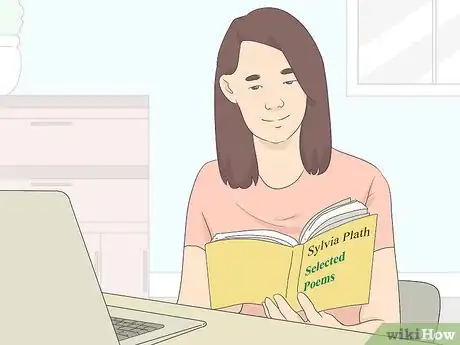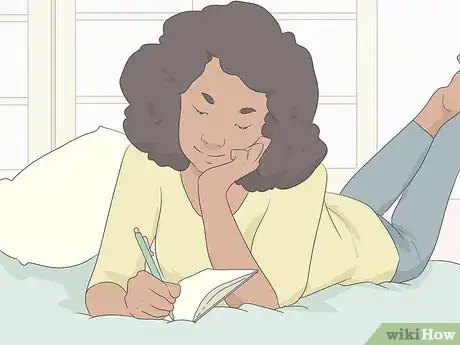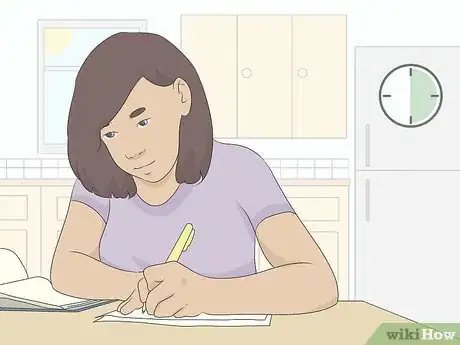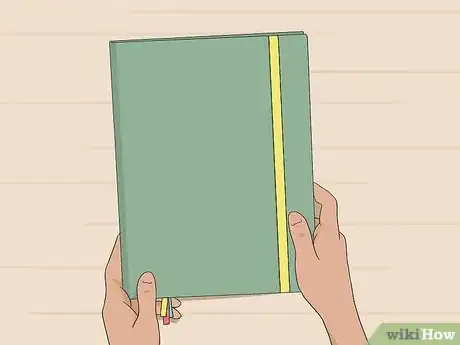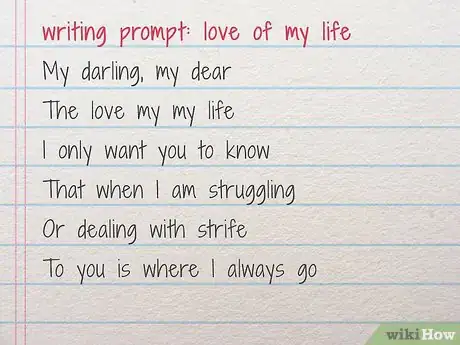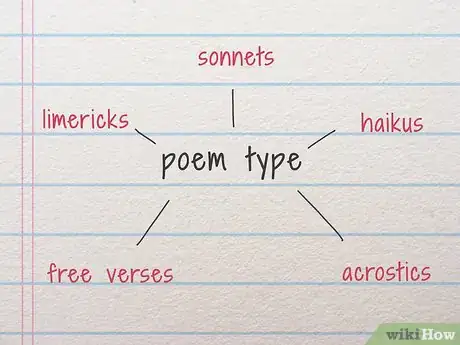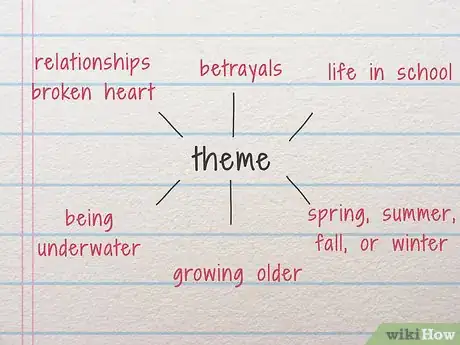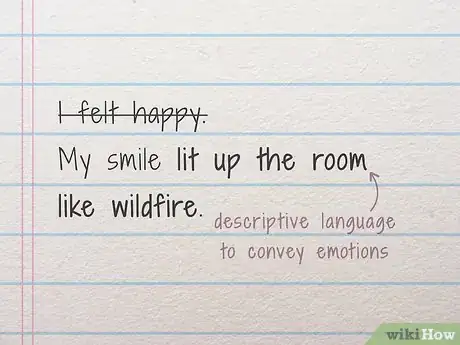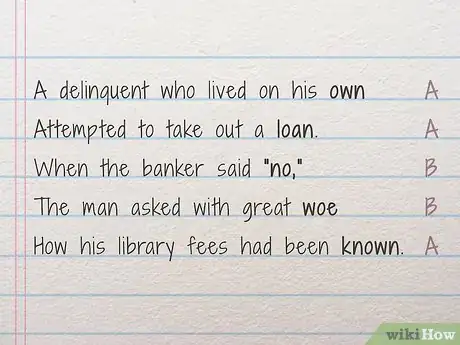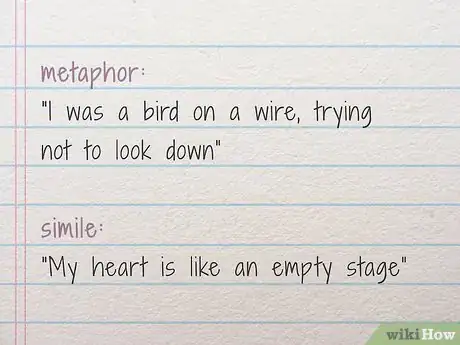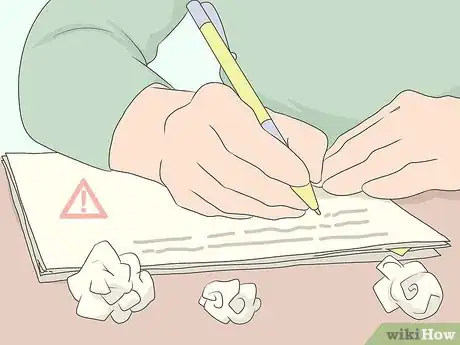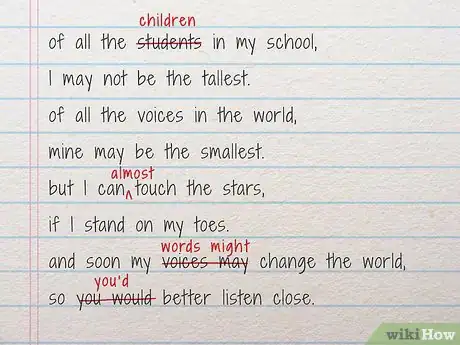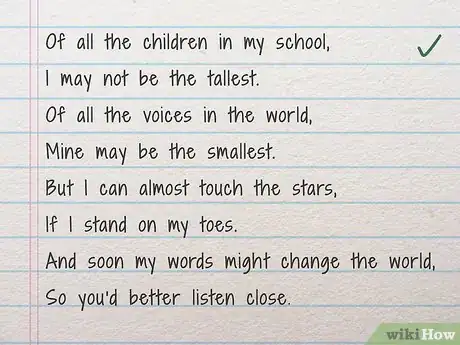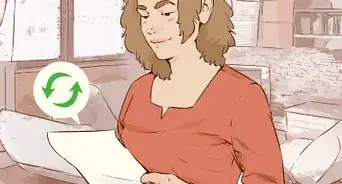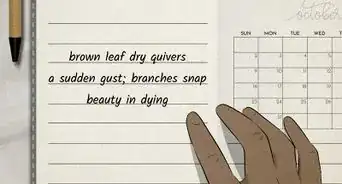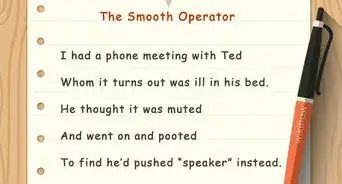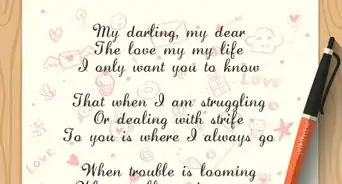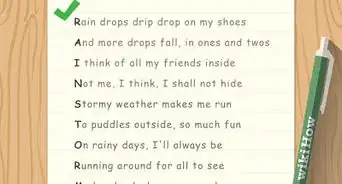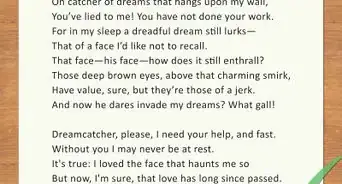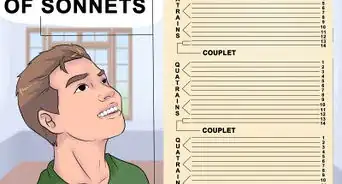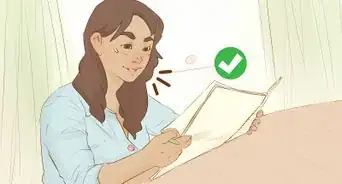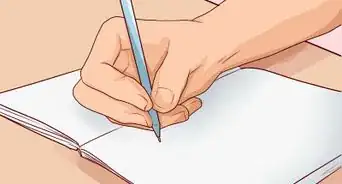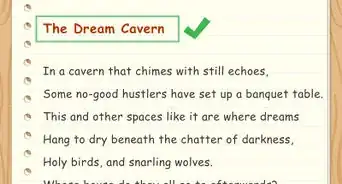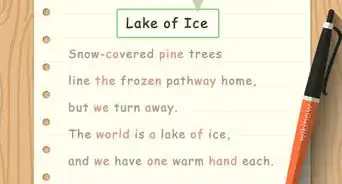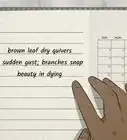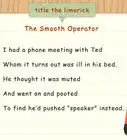This article was co-authored by Alicia Cook and by wikiHow staff writer, Hannah Madden. Alicia Cook is a Professional Writer based in Newark, New Jersey. With over 12 years of experience, Alicia specializes in poetry and uses her platform to advocate for families affected by addiction and to fight for breaking the stigma against addiction and mental illness. She holds a BA in English and Journalism from Georgian Court University and an MBA from Saint Peter’s University. Alicia is a bestselling poet with Andrews McMeel Publishing and her work has been featured in numerous media outlets including the NY Post, CNN, USA Today, the HuffPost, the LA Times, American Songwriter Magazine, and Bustle. She was named by Teen Vogue as one of the 10 social media poets to know and her poetry mixtape, “Stuff I’ve Been Feeling Lately” was a finalist in the 2016 Goodreads Choice Awards.
There are 13 references cited in this article, which can be found at the bottom of the page.
wikiHow marks an article as reader-approved once it receives enough positive feedback. In this case, 91% of readers who voted found the article helpful, earning it our reader-approved status.
This article has been viewed 205,283 times.
Writing poetry is a way to convey emotions, memories, and nostalgia without directly stating what you are describing. Writing poetry for the first time can be challenging, since there are so many ways to start and finish a poem. If you are a beginner and want to write poetry for the first time, use a journal to keep track of your inspiration and expand your language by using metaphors and similes to create beautiful and relatable poetry.
Steps
Finding Time and Inspiration for Poetry
-
1Read famous poems as examples to follow. People like Emily Dickinson, Edgar Allan Poe, Robert Frost, and Walt Whitman all changed the way people perceive and write poetry. Look up some poems by famous writers to see what you like and what you don’t like about each of them.[1]
- Langston Hughes, Maya Angelou, and Sylvia Plath are also famous poets that have varying styles.
- You can also see some examples of different styles and tones in poetry by comparing and contrasting authors.
-
2Get in tune with your emotions. A lot of poetry is saturated with feelings. You can easily inject emotions into your poetry if you understand what you are feeling throughout the day. Try to note whenever you are feeling a strong emotion and what made you feel it.[2]
- Understanding your own emotions can be difficult. Try to dissect how you feel on a daily basis, and what situations disrupt your mood often.
- Emotions are a great tool to use in poetry because people feel them universally.
Advertisement -
3Set aside time to write every day. The only way to get better at writing poetry is to practice it. Try to write poetry for at least 10 minutes a day, or more if you have time. Write about anything that you are inspired by.[3]
- If you think you will forget to write, try setting an alarm on your phone or using a post-it note to remind you.
-
4Keep a poetry journal with you to write when inspiration strikes. You never know when you might see something in your daily life that you want to write about. Carry a small journal or notebook around with you so that you can write down ideas or small poems in your daily life.[4]
Tip: Use a journal that is small enough to keep in your bag, or even your pocket.
-
5Use writing prompts to give you inspiration. If you’re having trouble getting ideas about what to write, look up writing prompts that are specific to poetry. Be as creative as you can when reacting to the prompts, and don’t be afraid to take them in an unorthodox direction.[5]
- For example, answer a prompt like, “Write about your first birthday party,” or, “Convey an emotion using only colors.”
- You can often find poetry writing prompts on sites that accept poetry submissions.
Beginning Your Poem
-
1Choose the type of poem you want it to be. Your poem doesn't have to be among an already-set category.[6] Poem structure is purely dependent on the poet and the poem itself. As a beginner, rhyming poems are a good structure to start with.
- A poem doesn't have to make sense grammatically. What matters is that your audience gets the message you want to communicate using your own formation of the words.
- Common poetry formats include: sonnets, limericks, haikus, acrostics, and free verses.[7]
-
2Decide on a theme for your poem. A theme is your topic plus your opinion on the topic. Something like “a sunflower” is just a topic. In order to create a theme, you have to explain your opinion on what you are writing about.[8]
For example: Do you like the sunflower? Does it invoke any emotions in you? Does the sunflower represent or remind you of something?
-
3Use descriptive language to convey emotions. To evoke feeling and depth in your poem, try describing an element, object, or emotion. You could write a whole poem just describing something. To help you get started in this descriptive process, ask yourself questions. Taking the sea as the example, here are the types of questions you'd ask yourself:[9]
- How does the sea look? Use descriptive terms relating to colors, motion, depth, temperature, and other standard features. The sea might be foaming, producing whirlpools, looking glassy, or turning grey at the advent or a storm; describe whatever comes to mind for you.
- What are some of its aspects that are noticeable in your sea? The froth of the waves, the fish under the surface, the height of waves during a storm, the lull when the wind dies down, the mounting garbage greys, a school of dolphins passing through, sea level rise along coastlines, the mournful cries of the Pacific gulls––these are all things you might notice in relation to the sea of your poem.
Writing the Rest
-
1Use rhyming words if you’d like your poem to have a rhythm. Some poetry uses rhyming words at the end of each line or every other line to create a flow. If you’d like to use rhyming in your poetry, try to insert them as you write, instead of thinking of them before you start writing.[10] For example, a poem could use words that rhyme with the last syllable of “seen,” like “clean,” “mean,” and “glean.”
- Try to think of these words yourself rather than looking them up in a dictionary or online so that your poem flows better.
- Stressed and unstressed syllables also create rhythm in a poem. In the sentence “He’d like some pumpkin pie,” “like,” “pump-,” and “pie” are all emphasized based on how you say them.
- If you're having trouble coming up with rhymes, check out rhymezone.com.[11]
- Feel free to use internal rhymes in your poetry! You don't have to end every line with a rhyme.[12]
- Remember that not all poems rhyme! It's okay if you don't want your poem to rhyme.
-
2Write your poem using metaphors and similes. Use language that doesn’t exactly describe what you want to convey, but instead uses metaphors and similes to portray emotions, settings, and people. Similes use the words “like” and “as” to compare something, while metaphors don’t.[13]
For example, you could say, “The sea was a night sky, expanding like an inkblot in the water.”
-
3Don’t feel like your poem has to be a certain length. There is no limit as to how long a poem is. Some are a mere sentence long, while others are paragraphs long or even the length of a novel. It all depends on when you are satisfied with your work.[14]
- Your first poem can be short. You can work your way up to longer poetry over time.
-
4Revise your first draft of your poem. When you first write something, it might not be the quality or the length that you would like. Come back to your poem after a few hours or days and take a second glance. Check for spelling mistakes, areas where writing could be tightened up, or places that need more information.[15]
- Remember that you are the poet, expressing your feelings through your poems so intuition, above anything else, is key.
-
5Create a final draft of your poem. Once you have revised your poem and you are satisfied with it, make a final draft by copying your finished poem to a clean sheet of paper. You can write it out, type it on the computer, or keep it in your notebook.[16]
- If you will be submitting your poem anywhere, it is very important to make sure your final copy looks exactly how you want it to.
Community Q&A
Did you know you can get answers researched by wikiHow Staff?
Unlock staff-researched answers by supporting wikiHow
-
QuestionHow can I write about a lost child?
 wikiHow Staff EditorThis answer was written by one of our trained team of researchers who validated it for accuracy and comprehensiveness.
wikiHow Staff EditorThis answer was written by one of our trained team of researchers who validated it for accuracy and comprehensiveness.
Staff Answer wikiHow Staff EditorStaff Answer
wikiHow Staff EditorStaff Answer -
QuestionHow can i write poem about nature?
 wikiHow Staff EditorThis answer was written by one of our trained team of researchers who validated it for accuracy and comprehensiveness.
wikiHow Staff EditorThis answer was written by one of our trained team of researchers who validated it for accuracy and comprehensiveness.
Staff Answer wikiHow Staff EditorStaff Answer
wikiHow Staff EditorStaff Answer -
QuestionHow can I write a poem about adult literacy?
 wikiHow Staff EditorThis answer was written by one of our trained team of researchers who validated it for accuracy and comprehensiveness.
wikiHow Staff EditorThis answer was written by one of our trained team of researchers who validated it for accuracy and comprehensiveness.
Staff Answer wikiHow Staff EditorStaff Answer
wikiHow Staff EditorStaff Answer
References
- ↑ https://earlybirdbooks.com/most-famous-poems
- ↑ https://www.nwp.org/cs/public/print/resource/402
- ↑ https://www.familyfriendpoems.com/poem/article-write-poetry-every-day
- ↑ https://www.loc.gov/poetry/180/007.html
- ↑ https://poetrysociety.org.uk/competitions/national-poetry-competition/resources/poetry-writing-prompts/
- ↑ https://www.familyfriendpoems.com/poems/other/
- ↑ Alicia Cook. Professional Poet. Expert Interview. 11 December 2020.
- ↑ https://jerz.setonhill.edu/writing/creative1/poetry-writing-tips-how-to-write-a-poem/comment-page-4/
- ↑ https://www.poetryfoundation.org/articles/70212/learning-image-and-description
- ↑ https://literaryterms.net/rhyme/
- ↑ Alicia Cook. Professional Poet. Expert Interview. 11 December 2020.
- ↑ Alicia Cook. Professional Poet. Expert Interview. 11 December 2020.
- ↑ https://www.poetryfoundation.org/articles/69588/the-start-writing-your-own-poem
- ↑ https://jerz.setonhill.edu/writing/creative1/poetry-writing-tips-how-to-write-a-poem/comment-page-4/
- ↑ https://jerz.setonhill.edu/writing/creative1/poetry-writing-tips-how-to-write-a-poem/#10
- ↑ https://abegailmorley.wordpress.com/2012/12/30/drafting-a-poem/
About This Article
If you’re a beginner trying to write poetry, start by deciding what your poem will be about, like love or a meaningful experience. Then, choose a structure that you're comfortable with, like rhyming or free-form. Next, come up with an interesting or mysterious first line that entices your reader to keep reading. Once you have a good opening line, use as many strong, descriptive words as you can in the rest of the poem to express your thoughts and feelings to the reader. To learn how reciting your poem out loud as you write can make your poem even better, keep reading!
